Carbs – especially sweets and simple sugars – are increasingly perceived as the culprit of a population that is gaining weight and losing health. The “war on sugar” has reached a point where it has discouraged people from enjoying the natural sweetness of fruits, which were once considered part of a healthy diet!
Taking a higher perspective – a biological view on diet, sugar, and fruits – can help to shed light on the question: Do fruits really make you gain weight?
For quick readers:
Do sweet fruits cause weight-gain?
The sugar in sweet fruits alone does not cause weight gain. While fruits contain energy in the form of simple sugar, the amount of calories is lower than we usually take in via complex carbs (same portion size) and other energy-dense foods.
What usually contributes to weight gain, is eating fruits on top of foods like:
- foods with added fats
- grains and starches
- highly processed foods
- Many cooked foods (that are not really suitable foods for the human species)
To set this into a bigger context for the sake of understanding the biology behind foods and weight gain: Fruits deliver calories in the form of sweet sugars to frugivores, as a natural energy source. In nature, energy is a limited resource, and, organisms forage to obtain the nutrient sugar – yes, glucose and fructose are the primary energy for fruit-eating animals (like humans are).
Our natural diet includes a lot more fruits than we do today – which certainly does not lead to obesity in the wild (i.e., chimpanzees). In fact, scientific research has reached a consensus on fruits being healthy! The main culprit is the “too much” of everything else: If you do eat much fruit, and additionally take in a lot of calories and complex sugars – which is actually a bunch of simple sugars stacked together – you get a calorie overload.
From a biological perspective, the healthy way of losing weight is not to reduce your fruit intake, but to reduce the amount of cooked food, complex sugars (starches), and overt fats, and, of course, highly processed food.
High-fruit diets do not cause obesity!
Fruits contain simple sugars, but their caloric load per weight is relatively low compared to other food types (see below). They are also nutrient-dense and hydrating through their high water content. Thus, eating fruits make you feel satiated with fewer calories (in terms of energy, water, and micronutrients), which prevents craving and eating other foods that are calorie-denser (like complex carbs and fatty foods).
There is a growing number of studies, emphasizing the importance of fruits in a healthy diet – and the positive effect of fruits on weight. The authors of this study point out the “paradox” of fruits obesity-fighting sweetness in fruits:
“Fruit contains large amounts of simple sugars (glucose, fructose, sucrose, etc.), which are well known to induce obesity. Thus, considering the amount of simple sugars found in fruit, it is reasonable to expect that their consumption should contribute to obesity rather than weight reduction. However, epidemiological research has consistently shown that most types of fruit have anti-obesity effects.”
Sharma et al., 2016
And this recent systematic review concludes:
“Current evidence suggests that whole, fresh fruit consumption is unlikely to contribute to excess energy intake and adiposity, but rather has little effect on these outcomes or constrains them modestly.”
Guyenet 2019
Those findings in nutritional science can easily be explained when taking an evolutionary perspective: We come from a highly frugivorous ancestry. The human diet naturally contains a lot of fruits – especially tropical fruits – and we are adapted to metabolize the nutrition of fruits! Our ancestors were fruit-eaters and originated in the tropics. And humans still carry the adaptations and genes of our “fruity roots”! We are perfectly adapted to fruits as the primary (and main) energy source!
It comes as no surprise, that real-life experiences supports the science and the evolutionary signs: People adopting a high-fruit diet reach their optimal weight after a while – almost without exception!
Losing weight on such a diet is not only an effective way – but the healthiest way! Therefore our recommendation clearly is: Substitute most cooked foods and complex carbs with high-quality tropical fruits to lose weight! (Read more here.)

Carb calories: The type matters!
Simple and complex carbs have the same amount of calories, but we perceive them differently.
We are prone to overeat complex carbs (like grains and starches) much more than sweet carbs in fruits – fructose, and glucose. This is, because our body does not get the sensory satisfaction from complex carbs, that it has evolved to have with sweet simple carbs from fruits! So while eating substantial amounts of calories in the form of complex carbs, we do not feel that we actually do get enough!
After all those instinctual intelligence is written in our genes and have evolved in our frugivorous past! Humans – and all primates – have a sweet tooth for a good reason! (see below).

Simple carbs from fruits taste sweet because our taste receptors identify the singular (or double) sugar molecule (monosaccharides or disaccharides). Complex carbs, on the other hand, are the same molecules but bonded to each other. They form string-like polysaccharides. The individual sugars within those strings carry the same amount of calories as the single sugar molecules in sweet sugar do – just without the taste! This is why starches taste bland unless we cook them and break them into smaller pieces by heating them.
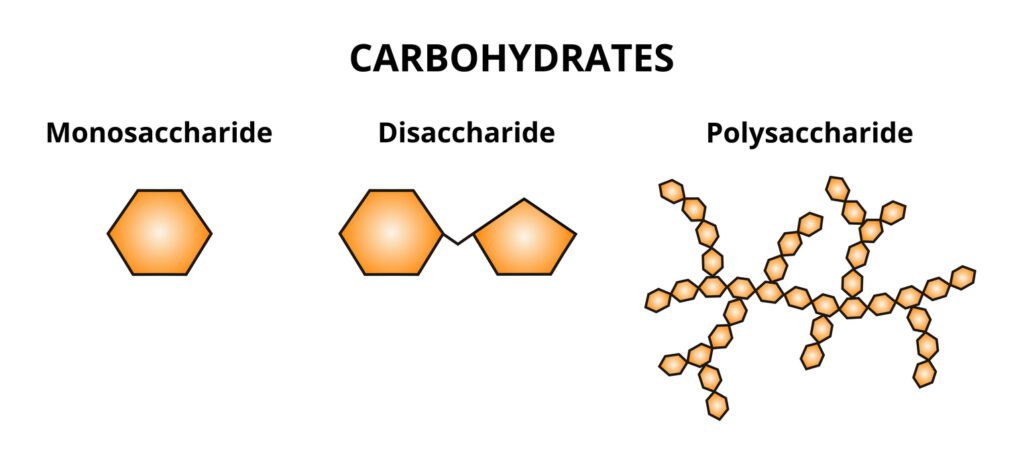
What this means is, that, just because carbs taste sweet, they are not “worse” in terms of health and calories. A handful of rice (dry weight) contains approximately the same amount of sugar molecules and calories as a handful of sweet sugar (dry weight)!

In the digestive process, the complex sugars are split up by enzymes into single molecules – simple carbs! So we end up with the same amount of sugar, but don’t have the pleasure of the sweet taste, which we have evolved to love and crave – as frugivores (fruit-lovers)!
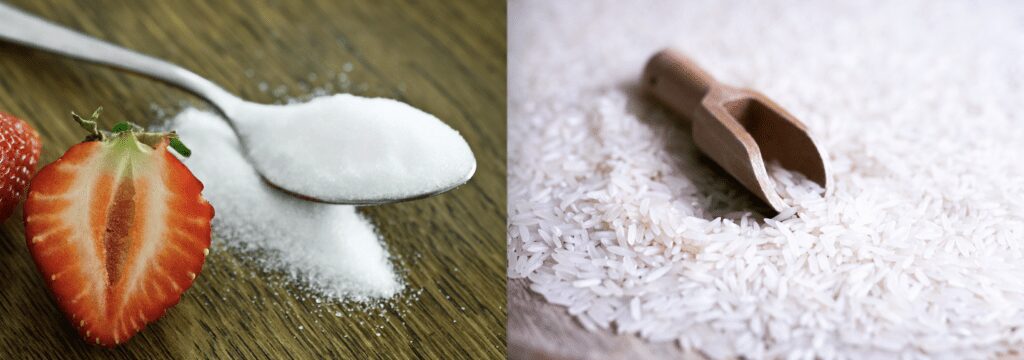
As a consequence of this misconception, we end up eating loads of non-tasty carbs (we even need to add salt to like them), while we avoid simple sugars like the plague: A handful of white rice is (rightfully) not perceived as harmful, while a handful of sweet sugar is perceived as a huge amount!
This does not mean that isolated sugar is healthy or does not contribute to weight gain. However, it does give us a new perspective on complex carbs! This also becomes apparent when comparing complex-carb foods, isolated simple sugars and fruits in terms of sugar content:
| Carb Type | Food | Sugar Content (per 100 grams) |
|---|---|---|
| Simple | Cane Sugar | 100 grams |
| Simple | Banana | 20 grams |
| Simple | Dried banana | 78 grams |
| Complex | Plain Rice (uncooked) | 91 grams |
| Complex | Cooked Rice | 44 grams |
Fruit: more nutrients per calorie. Complex carbs: Sugar-dense foods.
In fruits, we enjoy the taste of simple sugar, within a natural fiber-rich fruit matrix, and usually, this accounts for much fewer calories, than a meal with complex carbs. Complex-carb foods are sugar storage of plants – thus sugar-dense foods: Plants store their energy in the form of complex carbs in their roots (root vegetables) or grains (for their progeny). Sweet, simple sugars are not storage energy, but are the plants’ reward for fruit-eating, seed-dispersing animals (read more here).
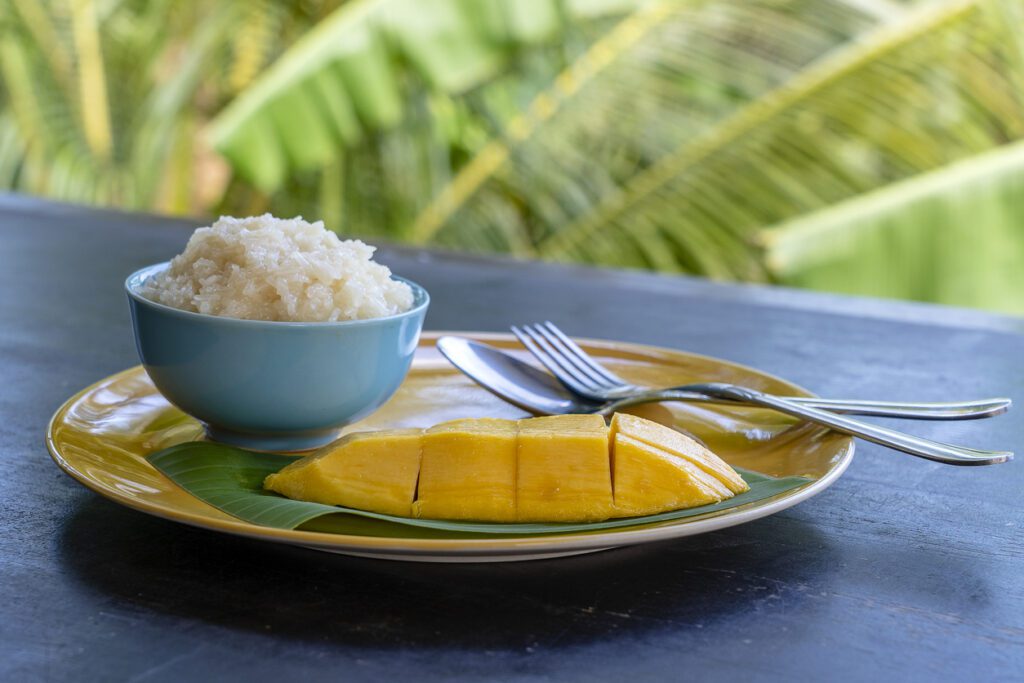
For example, 100 grams of banana (equals one small to medium-sized banana) or mango contains only 15-20 grams of carbs, which equals ca. 50 grams of cooked rice, or ca. 5 teaspoons of cane sugar. But it also contains loads of micronutrients and water, and leaves you much more satiated than plain rice or sugar!
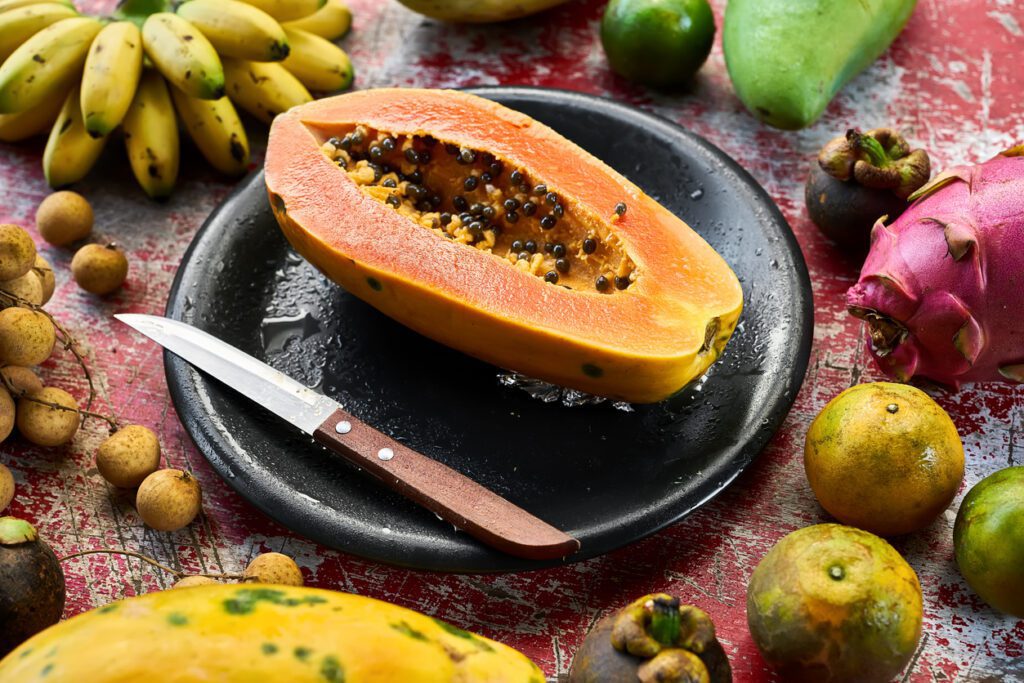
Eating fruits prevents you from eating more calorie-dense foods!
If you try to reach a significant part of the caloric requirement of an adult with fruits, you have to eat around 3 Kg of food – which equals around 25-30 bananas. Thus, it is challenging to overeat fruits in terms of calories!
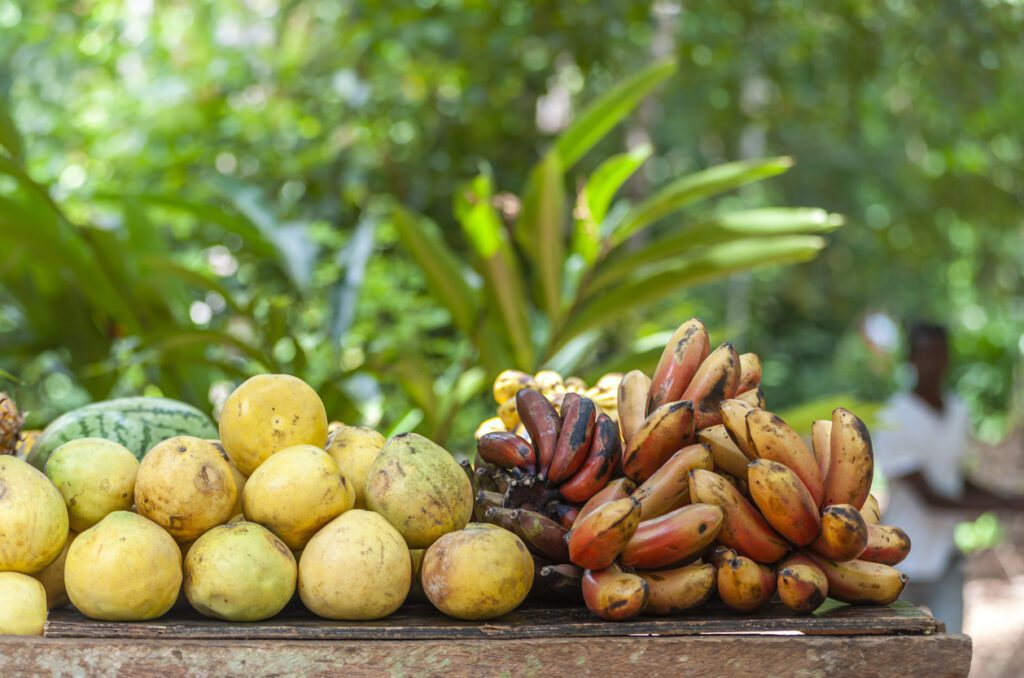
Is it the fruits that cause weight gain? Or the foods that you eat on top?
Many people believe that the sugar in fruits can add to their calories. This is not entirely false! However – in terms of weight gain – what you eat additionally to your fruits is more relevant: sweets on top of cooked complex carbs or fatty foods can add to the calorie count, but is not the “heavy” part. Fruits are not the main culprit, as they are nutrient-dense, watery (hydrating) foods, that add little calories relative to other food types.
| Food Group | Food | Type | Calories per 100g |
|---|---|---|---|
| Fruit | Bananas | Simple Carbs | 89 |
| Grains | Cooked Rice | Complex Carbs | 130 |
| Grains | Bread | Complex Carbs | 252 |
| Legumes | Black Beans | Protein / Complex Carb | 100 |
| Processed | French Fries | Complex Carb / Fat | 306 |
| Cooked | Roasted vegetables | Carbs / Fat | 93 |
| Meat | Beef | Protein / Fat | 160 |
| Dairy | Feta Cheese | Fat / Protein | 264 |
Our ancestry is frugivorous: Sweetness is a sign of energy and nutrition!
All great apes, including humans, are highly frugivorous in their natural habitat. This dietary characteristic is reflected in our genes and body: Our organism has evolved anatomical and physiological adaptations to eat mainly fruits.
As a consequence, optimally, most of our calories come from the carbs in fruits: Hexose (fructose) is the primary natural energy source of primates! Most complex carbs need to be cooked to become edible (read here why cooked foods are not really part of our species’ natural diet).
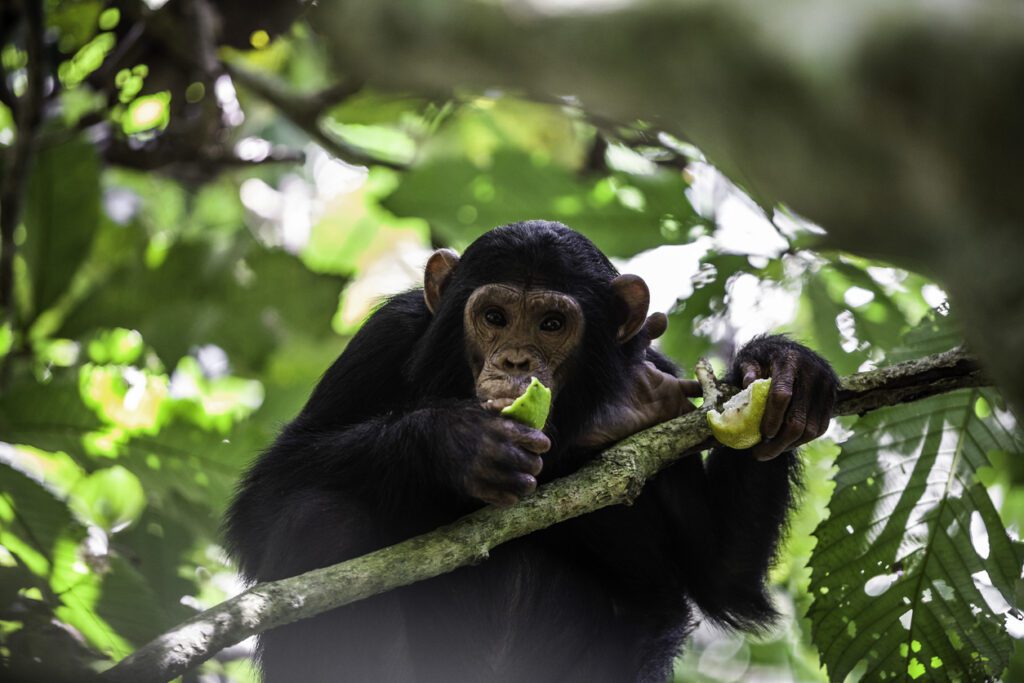
We have all heard it over and over again: “Carbs are unhealthy and make you gain weight!” But can this generalized dogma really hold up to the fact that carbs are essential nutrients in biology? The trend is that the newest research leans more towards favoring high-carb diets (see, for example, here) and raising critical voices against ketogenic (low-carb) diets.
“The ketogenic diet… may cause hyperlipidemia, vitamin and mineral deficiencies, fatigue, and kidney damage, among other complications. Increased acid production from a ketogenic diet may cause metabolic acidosis and related issues… people with chronic kidney disease and those without prior kidney problems are experiencing a decline in kidney function.”
Ayele et al., 2023
Undoubtedly short-term periods of activated ketogenic metabolism, during fasting, are highly beneficial for regenerative processes. However, humans have not evolved to run on the energy of fatty acids (ketogenic metabolism) long-term. Humans – as frugivores – are adapted to primarily run on simple sugars obtained from fruits! We see those adaptations to fruits as energy source in all great apes:

Sugars from raw foods – fruits – are not like isolated sugars!
Isolated sugars found in sweets are known to be empty calories and a contributing factor to obesity – and rightly so! Fruits, on the other hand, are loaded with fiber and micronutrients, and are nothing like processed sugar, also in terms of weight gain.

Fructose in fruits has a different health effect than man-made isolated fructose products! For example, fructose from fructose syrup disrupts the intestinal microbiome, while fructose in fruit (inulin and other fructans) feeds our beneficial bacteria!
The consensus in nutrition science is that whole fruits are health-promoting – and is not associated with obesity! This is a conclusion that comes as no surprise to the natural health community, especially the raw food community!
Fruits, insulin and weight gain
Weight gain and insulin resistance are tightly linked. Everything in scientific research points to the consensus that fruits prevent insulin and blood sugar issues – and are even beneficial for people with those types of conditions. Still, the dogma, that fruits should be avoided is persistent – much to the detriment of people trying to overcome insulin issues by avoiding a food group that is fundamentally important for human health and regeneration!
Concerning the question of whether sugar in fruit is somehow a culprit in insulin resistance and associated weight gain, the answer is clearly no, it is not!
Despite the bad reputation of fructose, which makes up half of the carbs found in fruits, fructose does not trigger insulin response – at all. Only glucose does! Glucose is the type of sugar found in starches and complex carbs.
For this reason, people with blood sugar issues are allowed to eat fruits, and for a while, fructose was even recommended to avoid insulin and blood sugar spikes!
Read more here, about why fructose does not require insulin production to enter our cells.
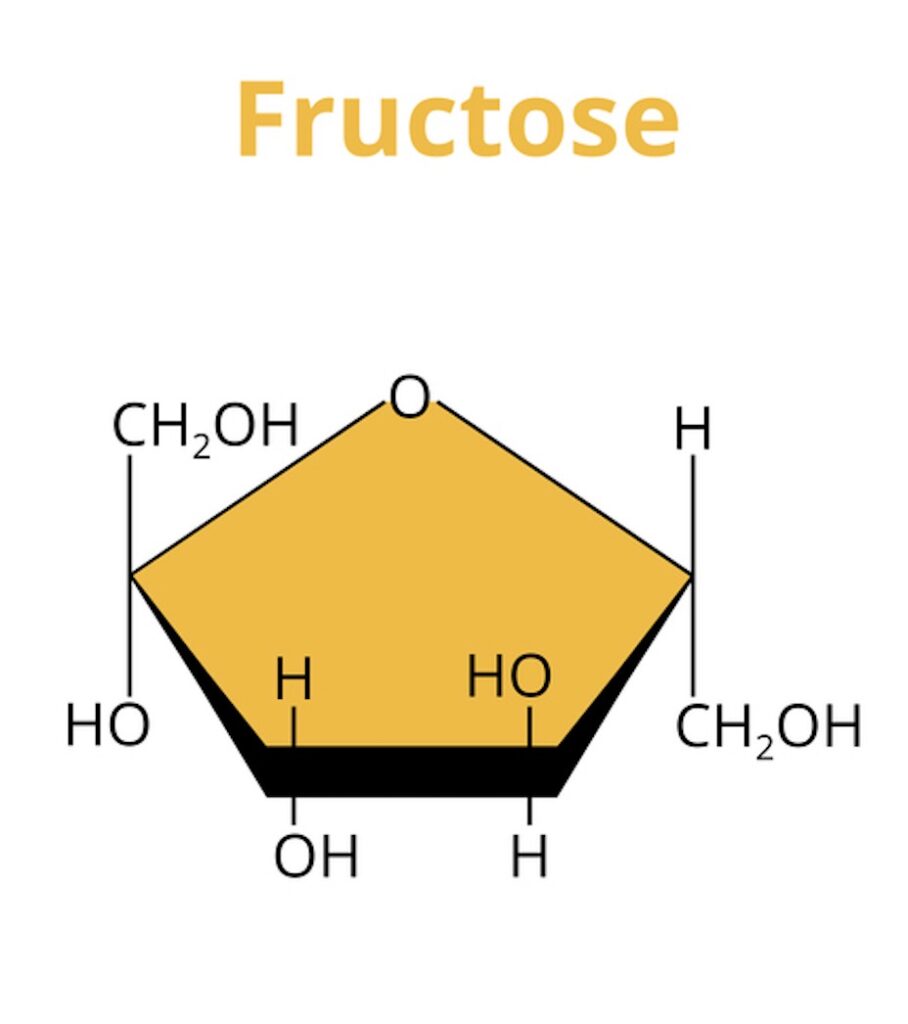
Conclusion: It is not the fruits that cause weight gain!
While fruits can contribute calories to a fruit-rich diet, they are not the culprits of weight gain. Fruits are imperative for human health and are the main part of a species-appropriate diet. The driver of weight gain is to be found in complex carbs, isolated sugars, isolated fats, processed foods, and toxic overload. Never cut back on fruits to lose weight, but cut back on cooked foods, unhealthy foods and replace some of those with more fruits!
References
- Sharma, S. et al. (2016) ‘Paradoxical effects of fruit on obesity’, Nutrients, 8(10), p. 633. doi:10.3390/nu8100633.
- Guyenet, S.J. (2019) ‘Impact of whole, fresh fruit consumption on energy intake and adiposity: A systematic review’, Frontiers in Nutrition, 6. doi:10.3389/fnut.2019.00066.
- Sylvetsky, A.C. et al. (2017) ‘A high-carbohydrate, high-fiber, low-fat diet results in weight loss among adults at high risk of type 2 diabetes’, The Journal of Nutrition, 147(11), pp. 2060–2066. doi:10.3945/jn.117.252395.
- N. Helms, Is the keto diet safe? what are the risks? University Chicago Medicine (2023) (available at https://www.uchicagomedicine.org/forefront/health-and-wellness-articles/ketogenic-diet-what-are-the-risks).
- Ayele, G.M. et al. (2023) ‘Is losing weight worth losing your kidney: Keto Diet resulting in renal failure’, Cureus [Preprint]. doi:10.7759/cureus.36546.
- Milton, K. (1999) “Nutritional characteristics of wild primate foods: Do the diets of our closest living relatives have lessons for us?,” Nutrition, 15(6), pp. 488–498. Available at: https://doi.org/10.1016/s0899-9007(99)00078-7.
- Liu, T.-W. et al. (2016) ‘Nondigestible fructans alter gastrointestinal barrier function, gene expression, histomorphology, and the microbiota profiles of diet-induced obese C57BL/6J MICE’, The Journal of Nutrition, 146(5), pp. 949–956. doi:10.3945/jn.115.227504.


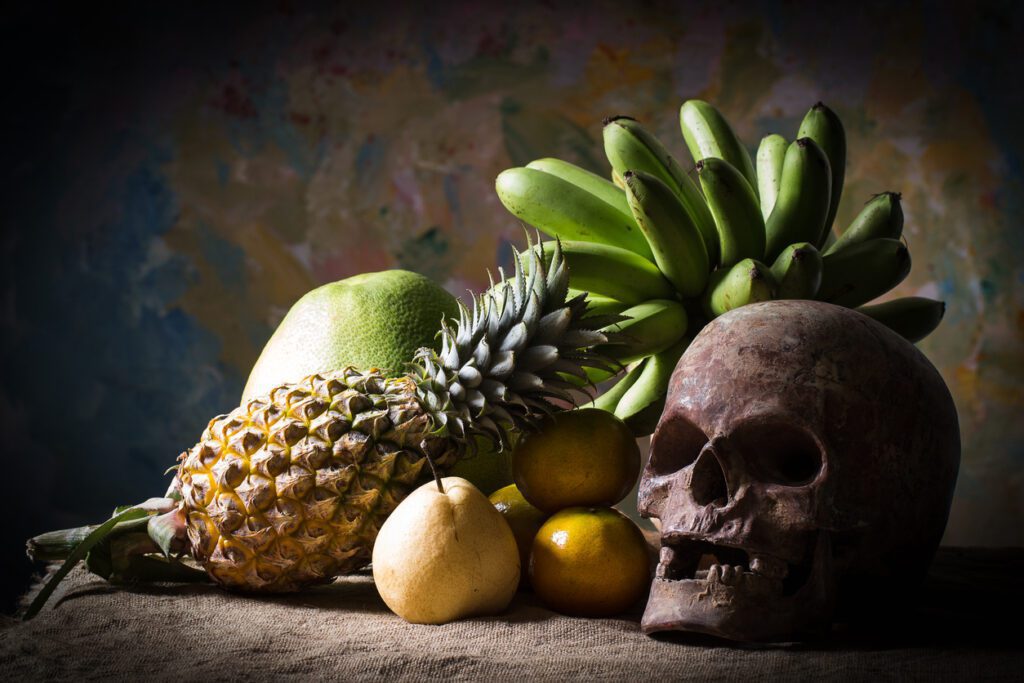

Add Comment